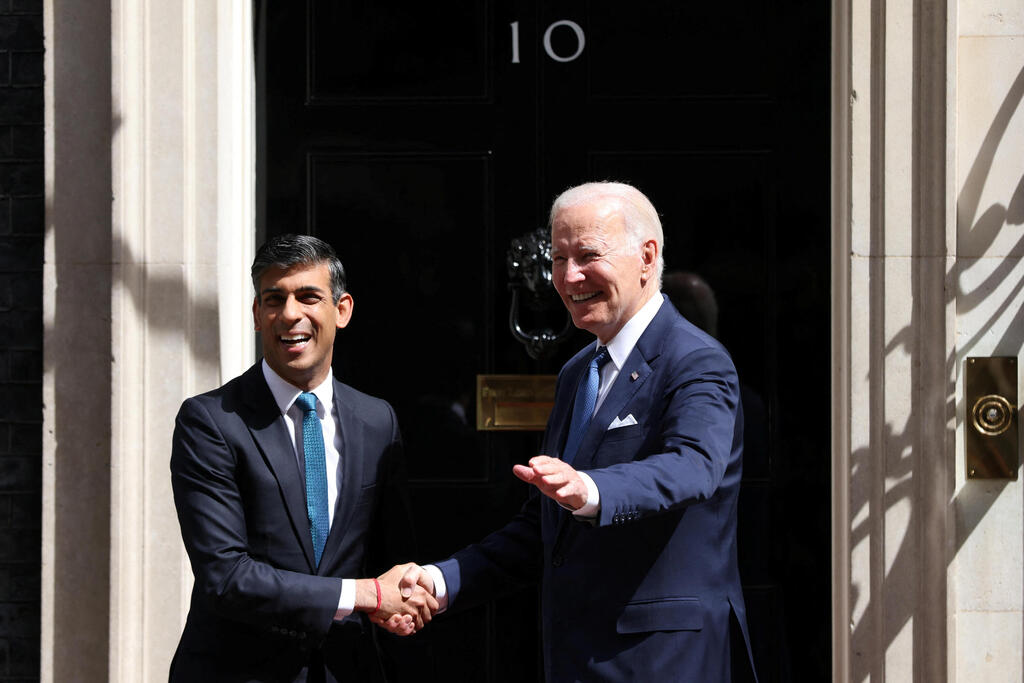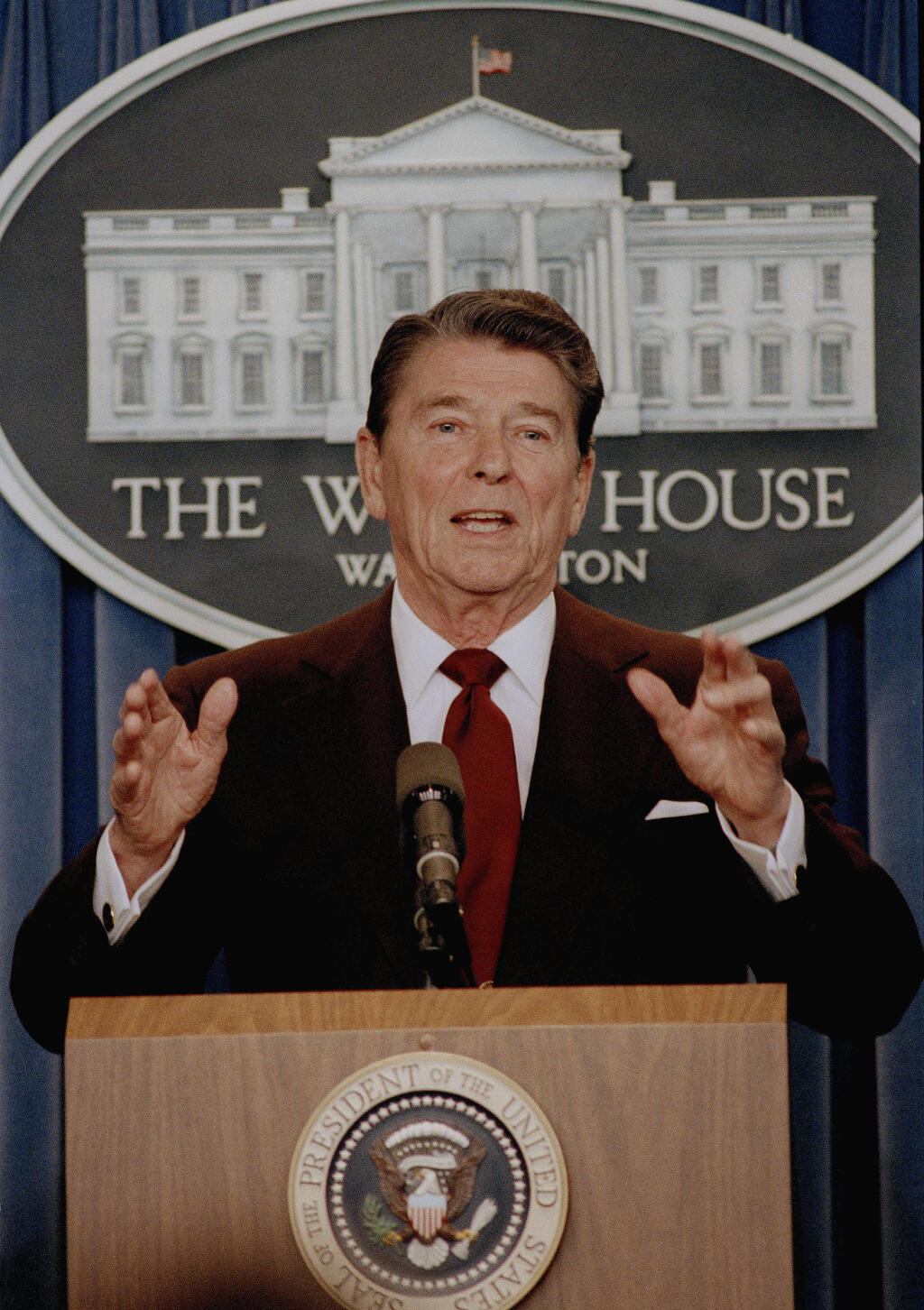Getting your Trinity Audio player ready...
As the current international pressure on Israel intensifies, the country must finally learn that it has no choice but to reject it, if it is to survive. In order to do so, it is first necessary to remember the awful consequences that Israel suffered from bending to international, and more specifically American, pressure in the past.
In November 1956 and again in February 1957, President Dwight D. Eisenhower threatened to withhold aid to Israel if it did not completely withdraw from the Sinai peninsula, which it had captured during the Suez campaign of 1956. Israel duly withdrew.
6 View gallery


US President Joe Biden and British Prime Minister Rishi Sunak
(Photo: Reuters/Hollie Adams)
Years later, in 1965 Eisenhower, allegedly expressed remorse, in the following terms: “I regret what I did. I should have never pressured Israel to evacuate Sinai.” Such comments by a retired President were, of course, of no consequence. Just two years after that, in May 1967, Egyptian President Nasser imposed a blockade on the Straits of Tiran south of Eilat, boasting that “there is a big difference between yesterday and today, between 1956 and 1967”.
Less than a month later, Israel had to fight a desperate war of survival against a coalition of Egypt, Jordan, Syria and Iraq. Withdrawing from the Sinai, only to retake it in a bitter war, had been a remarkably short-sighted action. It need not be written that neither Eisenhower, nor any other non-entity in his administration, was ever held accountable for their actions in 1956.
In March 1975, American diplomacy, or rather the incoherent blackmail that so often substitutes for diplomacy in America’s relationships with her Allies, was back. Israel was at that time still in control of most of the Sinai, and America was again busy pushing Israel out. On that occasion, President Ford infamously declared a “reassessment of United States policy in the region, including our relations with Israel”.
It took seven years, but in 1982 Israel handed all of the Sinai back to Egypt, in return for a cold peace which is still in force at present. In the process, a little town called Rafah was split in two, between Egyptian-controlled Sinai and Israeli-controlled Gaza. Within a mere two years, the first smuggling tunnel between Sinai and Gaza was in operation. Not coincidentally that year, 1984, was the year when future Hamas founder Ahmed Yassin was first arrested by Israel for weapons possession, as I recalled in my previous article.
6 View gallery


IDF celebrating Sukkot in Sinai during Yom Kippur War, 1973
(Photo: Arad Shlomo, Ltd)
President Ford died at the end of 2006, a ripe 93 years of age. Henry Kissinger, his Secretary of State, died a centenarian, a few short months ago. A great many other people have been killed, and continue to be killed, at a much younger age, because neither Ford nor Kissinger knew or cared about the consequences of Israel’s second withdrawal from the Sinai.
American diplomacy by way of extortion got worse, not better, over time. On August 12, 1982, none other than President Ronald Reagan, a man now remembered more for his pressure on the Soviet Union than for anything else, decided that he could not tolerate Israel’s efforts to destroy PLO forces in the western part of Lebanon’s capital, Beirut.
According to Lou Cannon’s book, “The Reagan Paradox”, the President stooped so low as to blurt out an exceptionally vile jibe at Israel’s Prime Minister Begin. “Menachem, this is a holocaust”. Begin chose to halt Israel’s operations under this kind of attack from Israel’s closest ally, and Reagan commented to the White House Deputy Chief of Staff, Michael Deaver, that “I didn’t know I had that kind of power”. No wonder American anti-Israel journalist Mehdi Hassan fondly remembered this incident a month ago, while falsely accusing Israel of genocide in Gaza.
Reagan did not in fact, have that kind of power. It was Begin who gave it to him, by succumbing to pressure. The evacuation of 15,000 Palestinian terrorists and their Syrian allies from West Beirut, which Israel agreed to eight days later, on 20 August 1982, did indeed open “a new chapter in the Middle East”, as the ever-wrong New York Times phrased it at the time. A new chapter of mass murder, unending terrorism and state collapse. This has been the fate of Lebanon, and not only Lebanon, ever since.
The newest and perhaps also the bloodiest chapter of Lebanon’s tragedy will most probably be written this year, when Israel will be forced to fight a war to put an end to the constant, and ever-growing, danger posed by Hezbollah. When Israel does so, it will do well to remember how President Reagan ended his involvement in the affairs of Lebanon. On 23 October 1983, Hezbollah killed 241 American and 58 French military personnel in two bombings. Reagan decided he was a lot less powerful than he had imagined, and promptly withdrew from Lebanon on 7 February 1984.
The lesson to be drawn from the above examples is that listening to American threats is not just dangerous for Israel, it is devoid of any purpose. Even Eisenhower and Reagan, men made of rather firmer stuff than President Joe Biden, did not possess the moral fortitude and strength of character to deal successfully with the crises of the Middle East.
Biden’s flailing administration, which cannot even get a UN resolution intended to pressure Israel past the double veto of the Chinese and Russian dictatorships, has no credible plan to deal with Hamas, or Hezbollah, or the Houthis. In fact, it has no plan at all, other than to somehow win another bitter electoral struggle in the United States, which will reach its conclusion less than 230 days from now.
America’s unreliability as an ally is not Biden’s fault alone. Donald Trump is engaged in his own fervent pursuit of the noble ideal of beating the other guy by any means, fair or foul. In the process, he claimed that “you would have had Iran in the Abraham Accords” had he not lost in the previous round of the Biden-Trump electoral circus.
Israel must stop listening to nonsense, and start decisively defeating its enemies. At the same time, it must explain to Americans at large, and publicly, that a long string of bipartisan failures of American foreign policy has brought the United States to a very low ebb. It is the U.S., not Israel, which is finding Middle Eastern crises increasingly impossible to deal with. It is the U.S., not Israel, which is bitterly divided between supporters of two exceptionally flawed Presidential candidates.
Israel must fight to win in Gaza and then in Lebanon, and it must also fight to win the battle of ideas to change the course of American public opinion, and hence of American policy. Without all this, Israel’s very survival will come under immediate threat.






